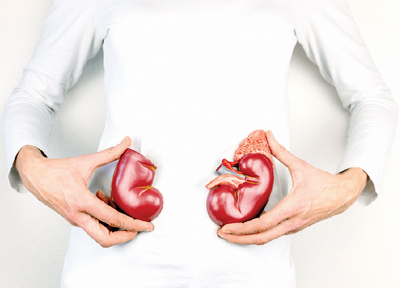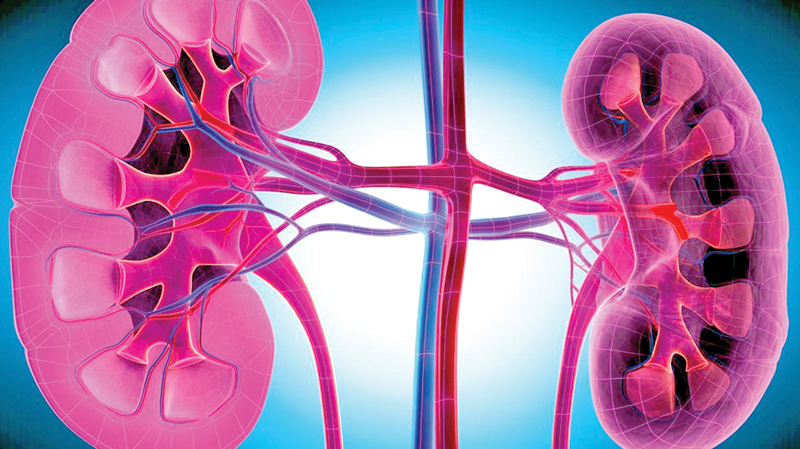 As Nephrologists across the world gather together to observe yet another World Kidney day on March 14, they will focus on Kidney Health for all and how equitable access to care and optimal medication practice can help close the current gaps in delivering quality kidney care for all irrespective of case, creed, religion or economic status.
As Nephrologists across the world gather together to observe yet another World Kidney day on March 14, they will focus on Kidney Health for all and how equitable access to care and optimal medication practice can help close the current gaps in delivering quality kidney care for all irrespective of case, creed, religion or economic status.
The Sunday Observer spoke to Consultant Nephrologist, University Hospital General Sir John Kotelawela Defence University, Dr Dilukshi Pilapitiya to get more insights into this debilitating disease which is now increasingly becoming a huge economic burden on health ministries and societies as a whole in the world over including Sri Lanka.
Excerpts:
Q: As many of our readers still lack basic knowledge about kidney disease, could you tell us what the role our kidneys play in maintaining our health?
 A. Kidneys are one of the body’s most complex organs. They perform many essential tasks which include removing body waste and toxins through urine, excreting excess water and ions like potassium. They also produce a hormone called erythropoietin, needed to produce red blood cells, and help to regulate blood-pressure. In addition, kidneys make the active form of vitamin D which is important for bone health.
A. Kidneys are one of the body’s most complex organs. They perform many essential tasks which include removing body waste and toxins through urine, excreting excess water and ions like potassium. They also produce a hormone called erythropoietin, needed to produce red blood cells, and help to regulate blood-pressure. In addition, kidneys make the active form of vitamin D which is important for bone health.
Q: What are the risk factors or conditions that drive this disease?
A. The conditions that may cause kidney diseases are:
1. Diabetes
2. Hypertension
3. Obstruction to urine flow (reflux nephropathy)
4. Heart disease
5. Conditions where Protein/blood-losing in urine (glomerulonephritides)
6. Genetic diseases (For example polycystic kidney disease)
7. Renal stones
8. Chronic interstitial nephritis of agricultural communities
9. Snake bites, leptospirosis
10. Certain medications like pain-killers (NSAIDs) can harm your kidneys.
Q: Explain to us the adverse fall outs on the human body as a result of these negative conditions.
 A. When insults to kidneys happen repetitively this leads to irreversible kidney damage. For example, when the kidneys can’t balance water, the patient starts to retain excess water. As a result, they can become swollen and even accumulate water in their lungs, making it difficult to breathe.
A. When insults to kidneys happen repetitively this leads to irreversible kidney damage. For example, when the kidneys can’t balance water, the patient starts to retain excess water. As a result, they can become swollen and even accumulate water in their lungs, making it difficult to breathe.
Q: What are the symptoms and signs to look out for in a person you suspect may be having a kidney related disease?
A. Leg swelling, swelling around eyes and frothy urine may indicate underlying protein losses via kidneys. Passing red/cola-coloured urine may indicate an underlying kidney issue. Renal stones may present as pain in the loin area which may or may not radiate to groins. CKD patients can present with darkening of complexion, itchy/dry skin, feeling nauseous, muscle cramps, fatigue, changes in urination or shortness of breathing.
Q: I understand kidney diseases are mainly of two types; acute and chronic. Is this correct?
A. Yes. When acute insults to the kidney resolve within 3-months, it is called acute kidney injury/acute kidney disease. But repeated insults can reduce the renal reserve in a person. The term chronic kidney disease is coined when the renal damage persists beyond 3-months of the initial insult.
Q: Can these symptoms be reversed if one seeks early treatment?
A. Yes, until a certain level. After kidneys are irreversibly damaged, symptoms can only be supported by means of medication and renal replacement treatment modalities. If diagnosed early, we can offer advice to optimise renal care in order to preserve kidney function which helps to delay the progression of kidney disease. In certain conditions like glomerulonephritides, which may manifest as passing proteins/blood in urine, early detection and treatment can halt the kidney damage.
Q: Is Diabetes and hypertension a cause?
A. Yes, diabetes is the leading cause of CKD worldwide. Long-standing diabetes/hypertension may damage kidneys, heart and brain. This is called target organ damage. Long-term diabetes/hypertension produces microscopic changes in blood vessels which damage kidneys and cause CKD. If diagnosed early, treatment strategies can bring large benefits especially when initiated early and maintained consistently.
 Q: In the past two decades, Chronic Kidney disease in agricultural communities (CKDu) has emerged as a significant contributor to the burden of CKD in rural Sri Lanka, with a prevalence of 15.1–22.9 percent. What is CINAC? Is this an emerging trend in kidney disease in Sri Lanka?
Q: In the past two decades, Chronic Kidney disease in agricultural communities (CKDu) has emerged as a significant contributor to the burden of CKD in rural Sri Lanka, with a prevalence of 15.1–22.9 percent. What is CINAC? Is this an emerging trend in kidney disease in Sri Lanka?
A. CKDu/new-term:CINAC)/chronic-interstitial-nephritis-of-agricultural-communities, is acquired by people living in certain endemic areas and is believed to be due to environmental exposures. Current thinking denotes it’s due to exposure to heavy metals/toxins in pesticides, which are trapped in the hard water in these areas. Exposure to high environmental temperatures with inadequate hydration are theories which are not proven as causes. CINAC is now becoming slightly less more prevalent in affected communities. This is thought to be due to better availability of clean water and more awareness of the disease making people more cautious and keener towards following good health habits.
Q: In CINAC, are the symptoms similar to ordinary kidney disease?
A. Yes.
Q: Who are those most vulnerable to getting CINAC?
A. Low health literacy people with unhealthy exposure to pesticides/drink from unclean water supplies, i.e. abandoned wells in areas of high pesticide usage are more vulnerable.
Q: World Kidney Day falls on March 14. This year’s theme is “Kidney health for all – Advancing equitable access to care and optimal medication practice / closing the gap.” What is its significance and why was it chosen? What relevance does this have for Lankan patients?
A. Globally patients struggle to access optimal healthcare due to high costs and misinformation. This is chosen to narrow the gap between what we know and what we do – “closing the gap.” Historically it had taken years for clinical evidence to come into daily practice.
New therapeutic advances have shown to be promising in delaying the progression of kidney disease. Since it is not wise to wait for years for this new evidence to trickle into clinical practice, this topic draws urgent attention to address the known barriers and global disparities in access to diagnosis and treatment.
Despite an adult literacy rate of 92.4 percent, Sri Lanka still has low health literacy, depicted in unhealthy lifestyle choices seen in the majority. Empowering patients and communities by raising awareness about chronic kidney disease (CKD) risk factors such as diabetes, hypertension and obesity is mandatory to promote healthy self-care strategies. These preventive strategies are the best way forward in trying to help reduce huge health care costs related to managing patients with advanced CKD.
Q: What are the main gaps you see in quality care to kidney patients in Sri Lanka?
A. With the massive brain-drain we are at a disadvantage by losing well-trained healthcare workers, widening the gap in Sri Lanka. The recent economic catastrophe made it challenging to ensure essential drugs reach our patients further widening the gap, but we are having slow amelioration of this problem over the last few months.
Q: How would you like to close these gaps?
A. To achieve equitable access of health to all at risk of kidney disease, we must raise awareness in policy makers, healthcare workers, patients and the general population to harness innovative strategies and balance profits with reasonable pricing of new drugs and private health care services. This will help narrow the gap making kidney health a reality worldwide. As for Sri Lanka, developing sustainable national development policies become paramount in ameliorating this condition.
Q: Do you envisage a brighter future for Lankan kidney patients since we now have access to new hi-tech equipment to detect/treat patients?
A. Sri Lanka is providing dialysis for below 4,000 patients currently and we are a leading country with a good transplant program in the South Asian region.
We are in need of further expansion of facilities due to growing numbers of patients with end stage renal disease.
Q: As eating unhealthy foods can lead to diabetes/hypertension two leading causes of CKD, could you share with us examples of healthy foods how to cook healthily to minimise these risks?
A. Choose whole grains (whole wheat, brown-rice, oats, unprocessed products)& veggies. When eating meat/fish choose baking/broiling rather than frying. Choose food with no added sugar and less salt, read labels (if you read labels of salad dressings you will not pour them over your salad because you must walk miles to get rid of those calories.). Slow down at snack time – choose healthy options during late-night work shifts/stressful periods like celery chops, carrot/guava cuts, low fat popcorn, peeled oranges, etc.
Q: Is transplant surgery a good option for a badly damaged kidney?Why?
A. Having a kidney transplant changes a patients’ life forever. Patients on dialysis must reach their dialysis center at least twice-weekly. This limits their ability to travel. They cannot drink water to quench their thirst as fluid is restricted to ~500ml/day. All these limitations are overcome after a successful transplant.
Q: What if the patient rejects it for some reason?
A. There are many options available to manage rejection. Ex:plasma exchange, ATG/rituximab injections. These are expensive regimes but thankfully all these are available and provided by the government of Sri Lanka.
Q: So what precautions are taken to minimise these risks before surgery?
A. Patients must undergo an extensive array of investigations to rule out underlying diseases which may become worse after a transplant. For instance, if someone has a chronic infection/underlying cancer, this may become uncontrollable after initiation of immune-suppression medication post-transplant.
As kidney patients are more prone to get heart attacks, the heart needs to be optimised before transplant. Donors are investigated extensively to ensure good health prior to organ retrieval.
Q: Is there an age limit for donors?
A. The age cut-off for males is 25 years/females 30 years. There is no universally accepted upper-limit for age. Older donors are accepted provided they are in good health and the age gap is reasonable.
Q: How soon does it take for a patient to recover usually?
A. Donors can resume light-work 2-4weeks/hard work 4-6weeks’ post-surgery or depending on the medical opinion on discharge. Kidney recipients need to be followed up closely during initial 3-months, monthly thereafter. Transplant recipients should ensure to avoid dirty/polluted environments plus places/people they could contract infections from.
Q: Does the patient have to continue to take drugs daily after surgery? If so for how long?
A. After a kidney transplantation, medications which modifies their immunity should be taken lifelong. In addition, they should be reviewed in clinics regularly to adjust doses according to changes in their physiology.
Q: Side-effects of these drugs?
A. Transplant patients are on mandatory immune-suppression drugs, which reduce their ability to fight infections. These drugs can cause high blood-pressure and alter your blood sugar and thus they need to be monitored regularly. They can have other side-effects such as elevated potassium levels, low white blood cell count. We monitor blood levels of these drugs to keep them at optimum levels.
Q: Why is it important to be worried about your kidney health?
A. Currently kidney disease is the 8th leading cause of death according to global data, which will be projected to 5th leading cause by 2040, if it is left unaddressed.
Q: Have you a message to readers?
A. Prevention is the best method. Eat healthy – high nutritious value but less calorie-dense. Minimise salt and sugar intake. Walk 10000-steps per day and don’t keep gaps of 72 hours in between your exercise schedules. According to the latest studies, WHO recommends at least 150minutes of moderate-intensity exercise per week or 75 minutes of vigorous-activity per week.
Aim for a healthy weight-have your target BMI<25. Stop smoking- it harms your kidneys. Manage stress by engaging in stress-reducing activities- listening to music, yoga/meditation/gardening regularly. Avoid unnecessary use of painkillers. Adhere to a healthy lifestyle and don’t forget to screen for diabetes/hypertension regularly. Early detection will help better control of these diseases from early stages and mitigate their progression to CKD. Those with diabetes/hypertension should also try to get their blood sugar/blood pressure within targets with regular follow-up.









